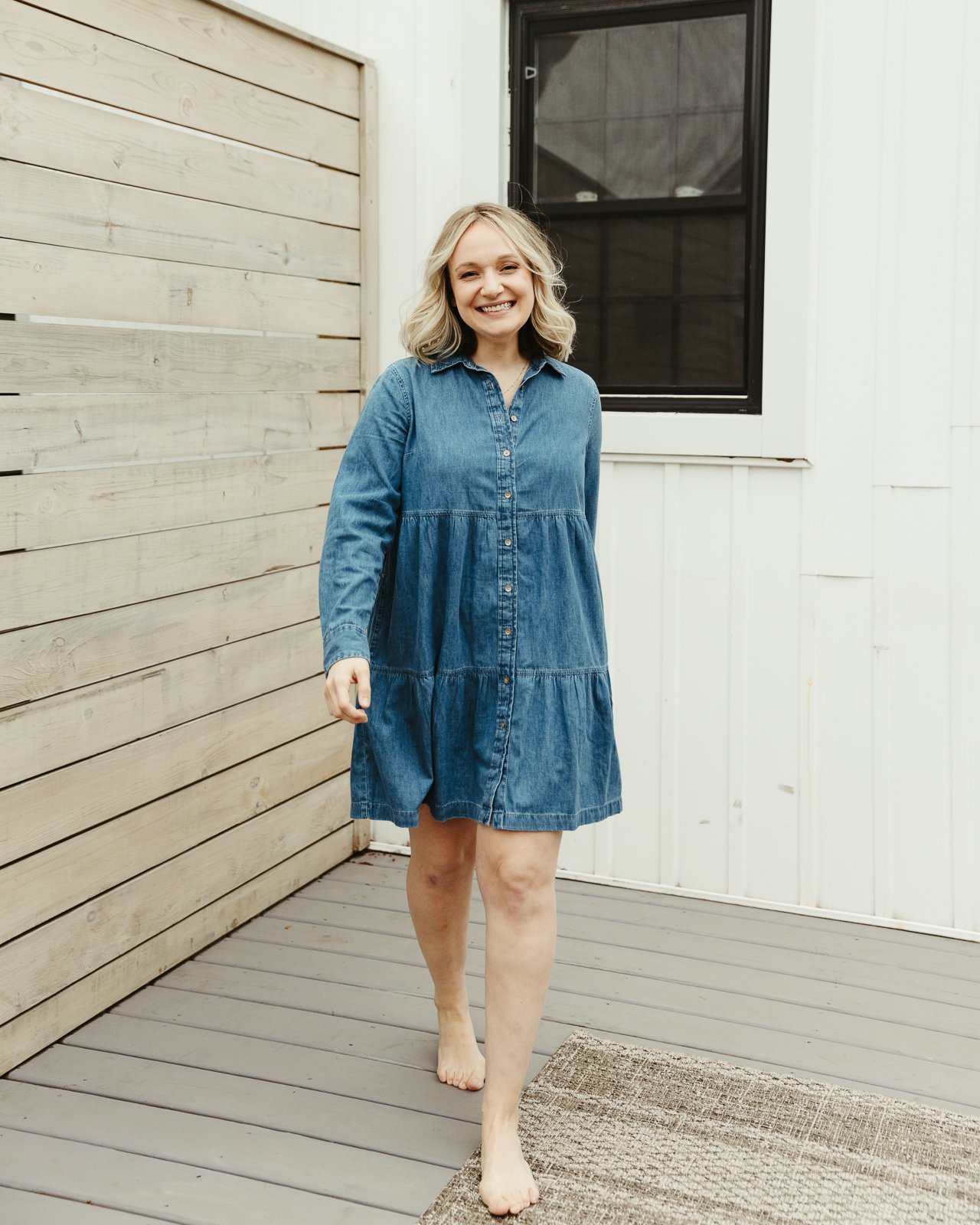Meet Megan, Milwaukee Therapist
I'm glad you're here.
There's a solid chance you've had a handful of reactions while trying to find a therapist and at the thought of therapy itself. You're probably curious, overwhelmed, and a little nervous. Hey, I understand. I've felt that way, too.
There's a better chance you're questioning if I'll get you and if we'd make a good fit.
That makes sense even if therapy is mostly a one-sided relationship. After all, I'm a stranger who cares to know about your most vulnerable parts. It is only fair that you'd want to see what I'm all about.
No need to sleuth your way through the Internet to get answers about who I am or how I might be in session. I will do my best to bear part of myself right here, right now.
I'll make a long but not uncommon story short. I ventured to become a mental health therapist after my own experiences in therapy.
Now being on the opposite side of the couch, I'll admit that I feel some pressure to say what helped me were the strategies used, the "homework" given, or the expertise my therapist exuded.
But I'd be lying if I did.
What actually stuck with me from that time?
The good came from genuinely connecting with another person in a safe, warm environment.
That kind of changed everything.
#1 — The Big Why
Reflecting on my work these days, I look to give my clients what someone else once gave me.
This might sound so simple, but I mean it with such sincerity.
When we focus on what is happening — human to human — in the therapy space, we start to experience our pain in such a different light. It is then we can better understand our struggles, our relationship with ourselves, and our relationships with others.
Those shifts can be hugely influential.
Above everything else, the therapeutic relationship is what creates enduring change. (Research would also back me up here.) That is why I take a relational approach. I genuinely prioritize and value the relationship between my clients and myself.
#2 — What I Care About the Most
In addition to the therapeutic relationship, I also care about helping you hold the confusing, tangled, and unpleasant parts of life. That is why I primarily practice from an existential-humanistic perspective.
What does that mean? Bear with me.
After working in various settings, I know all too often therapy can be hyper-focused on "quick fixes," advice, coping strategies, toxic positivity, rigid steps, and oversimplifications.
This approach to therapy is incredibly unfortunate. Taking a route like this to healing glosses over the fact that, at times, life is painful and messy. It also fails to trace how our day-to-day relates to a deeper layer that likely matters quite a bit to us.
As much as any of us might want to avoid the pain and mess, I promise we are much better off trying to embrace it. You might be surprised by what comes from doing so.
#3 — Philosophy of One Milwaukee Therapist
In session, clients say I am emotionally attuned, validating, compassionate, down-to-earth, relatable, and playful.
I want to think that's not just who I am as a therapist but also as a human being.
During the therapy hour, I want to be there with you as we move through what is causing you distress. I will balance exploring your current symptoms with the connection these symptoms might have to deeper, more profound concerns. I will also attempt to incorporate tangible "action items" from time to time to help move our work along and help you make better sense of your experiences.
#4 — How Clients Describe Me & Sessions
As a therapist who comes from various privileges, I am responsible for doing work inside and outside of sessions to establish an inclusive, affirming, equitable, and diverse therapy space for all.
In particular, at a minimum, I vow to…
Remain mindful of how the mental health system has and continues to perpetuate oppression and suffering.
Address barriers that prevent all people from accessing high-quality mental healthcare.
Cultivate an environment that provides a sense of safety for clients of all identities, allowing them to be vulnerable and pursue healing on their own terms.
Continue learning about the experiences of others based on gender identity, ethnicity, race, sexual orientation, religion, body size, ability status, socioeconomic status, and education without further burdening historically marginalized and excluded communities.
Listen with openness and tenderness to those who have feedback for me, have been hurt by me, or wish to share how they have historically experienced people with similar privileged identities to mine.
#5 — Creating A Sense of Belonging
For those still reading, I'll leave you with this.
Irvin Yalom, a famous psychiatrist, once said therapists and clients are fellow travelers — neither are immune to the inevitable darkness of existence, and both are destined to experience the exhilaration of life.
I want to help you find that 'exhilaration of life.' Starting that journey may be intimidating, but know that I'm here to join you in the process of healing.
Let's start today.
#6 — We Are Fellow Travelers

“Life is not a problem to be solved, but a reality to be experienced.”
― Soren Kierkegaard
In a nutshell, I am a proud Badger through and through.
2015: I received my Bachelor of Arts (B.A.) in Psychology with a certificate in Gender & Women's Studies from the University of Wisconsin-Madison
2018: I received my Master of Science (M.S.) in Counseling Psychology from the University of Wisconsin-Madison.
(Fun Fact About Me: I was a campus tour guide during part of my undergraduate degree, which was arguably my second favorite job.)
#7 — My Education
Ever wonder what is the difference between a counselor and a therapist? Picture a Venn Diagram, and I fall in that section right in the middle.
There are many ways to become a therapist, and we tend to use terms interchangeably. My degree allowed me to become a Licensed Professional Counselor (L.P.C.) and practice therapy in the State of Wisconsin.
My degree and license share roots with psychiatrists, psychologists, Licensed Clinical Social Workers (L.C.S.W.), and Licensed Marriage and Family Therapists (L.M.F.T.). However, for any history buffs, my specific credentials initially formed from a significant need for career counseling following World War II.
I have been in practice since 2018. Before private practice, I worked in many different levels of care, including acute inpatient psychiatry, partial hospitalization, and intensive outpatient programs. In these spaces, I provided brief individual counseling as well as group therapy.
#8 — My Credentials
#9 — The Human Behind The Therapist
When I am not working, I love to spend time with my pup and share adventures with my spouse. My favorite things include pop punk music, crowd surfing at concerts, good coffee, getting outside, being near water, exploring breweries, playing cribbage or euchre, and getting lost in a good T.V. show (like Gilmore Girls for the hundredth time).
I have a strong desire to do therapy, and I want to do it well. I am devoted to being a lifelong learner in this space.
In case you are wondering, lately, some topics I am working to understand better include…
Existential-Humanistic Therapy — Currently consulting weekly with other like-minded professionals passionate about existential-humanistic therapy. Dr. Orah Krug hosts these sessions and is considered a master clinician in the field.
Introduction to Community Psychology: Becoming an Agent of Change — Currently learning how mental health professionals can effectively enact change to shift the inequitable distribution of resources, which causes social problems such as poverty, homelessness, unemployment, and crime. This text is written by Leonard A. Jason; Olya Glantsman; Jack F. O'Brien; and Kaitlyn N. Ramian.
Intuitive Eating — Starting in 2022, I began a professional and personal journey to learn the principles of Intuitive Eating and how to incorporate these concepts in the therapy space.
Effects of Climate Change on Mental Health — In 2022, I published an op-ed titled "Finding balance in caring for yourself and the climate" in the Daily Herald.
#10 — To Be One of the Best Therapists In Milwaukee
featured on…
Therapist & A Couch proudly partnered with the following organizations striving to improve mental health care access.




















